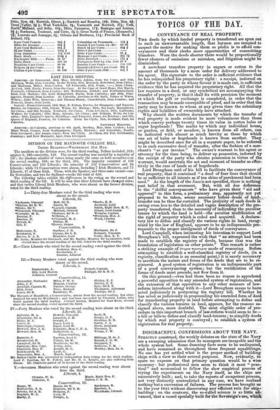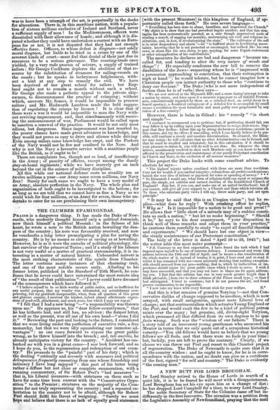was to have been a triumph of the art, is
perpetually in the docks for alterations. There is, in this maritime nation, with a popula- tion of sixteen millions exclusive of Ireland and Scotland, never a sufficient supply of men! In the Mediterranean, officers were dissatisfied with their allowance of hands ; and although it is dis- puted whether they could have undertaken a contest with an Euro- pean foe or not, it is not disputed that they had not enough effective force. Officers, to whom defeat is disgrace—not solely moral disgrace, but liable to be tried as a crime by one of the severest kinds of court—must feel that denial of their just due in resources to be a serious grievance. The coasting-trade once yielded, by a very rude process of seizure, a supply of trained sailors : Sir George Cockburn deplores the abolition of that re- source by the substitution of steamers for sailing-vessels on the coasts ; but he speaks in lachrymose helplessness, with- out a hint at any step to remedy the evil. We have been deprived of-our great school for sailors; but Eng- land ought not to remain a month without such a school. Sir George also made a pathetic appeal to the private ship- owners, to discountenance the practice of crimping; without which, answers Mr. Somes, it would be impossible to procure sailors; and Mr. Hedworth Lambton made the bold sugges- tion of regulating the crimps by licence 1 It is clear that if there were a war it would be impossible to man the Navy with- out reviving impressment, and, that simultaneously with receiv- ing the announcement of war, Parliament would be called upon to sanction a renewal of the practice. It would be not only most odious, but dangerous. Since impressment was last resorted to, the poorer classes have made great advances in knowledge, and they would not prove so easy to drive and silence while driving. Even among sailors some knowledge has crept, and the Parkers of the Navy would not be few nor confined to the Nore. And why is not the Navy a favourite service with a maritime people like the British, as it ought to be I There are complaints too, though not so loud, of insufficiency in the Army ; of paucity of officers' except among the dandy stay-at-home regiments ; while we have scarcely got an inch beyond the cat in the science of military discipline.
All this while our national defence costs us steadily ten or twelve millions a year—our Army some seven millions, our Navy four 1 Surely for such sums we ought to have a very model of an Army, absolute perfection in the Navy. The whole plan and organization of both ought to be investigated to the bottom ; for as long as we are told that we cannot have as fine a Navy as we could wish for four millions, or an Army for seven, those who un- dertake to cater for us are proclaiming their own incompetency.



























 Previous page
Previous page